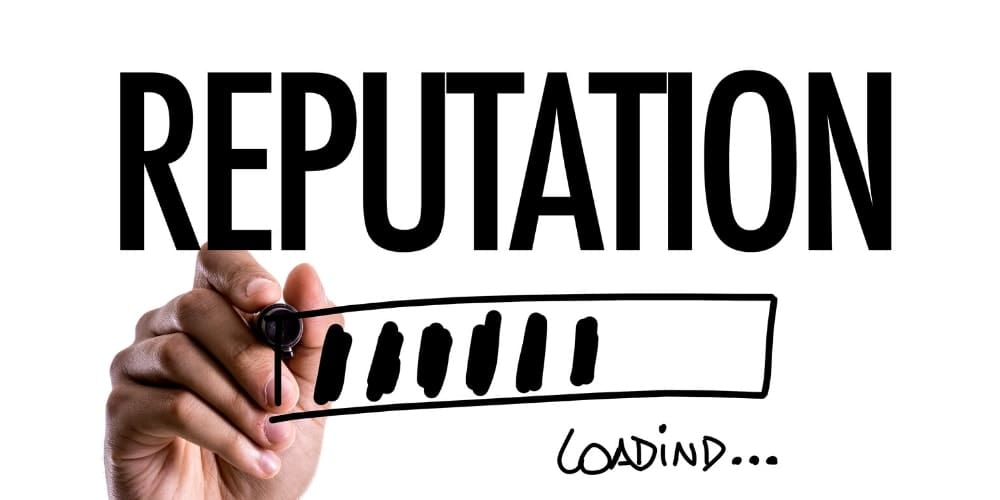Having a bad business reputation can cripple your business. Let us help you uncover new ways of how you can monitor and manage the reputation of your business more efficiently.
One of the most famous business quotes in history comes from the man, the myth and the legend himself, Warren Buffett. In Buffett’s early years he would pride himself on not only his business skills but also his business reputation, or how others viewed him. This led to him coining the famous quote, “It takes 20 years to build a reputation and five minutes to ruin it. If you think about that, you’ll do things differently”. For such a short quote, it speaks volumes and couldn’t be truer. You only have one reputation, let’s make sure it’s a good one!
Your reputation is malleable, it is not something you can work at for a few weeks an expect long-term results. In order to build a strong and sustainable safety net, we like to call your reputation, it requires work. Whether you decide to manage the reputation for your business or employ a third-party, it is imperative that you remain proactive when dealing with how your name appears online. Do not wait until something negative happens before you decide to take action.
Have you given any thought into how you would combat negative impacts on your brand or business’ reputation? Where do you start? Who do you call? How long will it take to fix it? What will it cost me?
All of these are valid questions that we will discuss later on in this article. Here at NetReputation, we are here to assist in shedding more light on how you can recover from a bad business reputation, should this unfortunately ever happen to you.
Request a Free Consultation
Is Reputation Management New?
Not in the slightest. Formerly referred to as Public Relations or Human Resources, Reputation Management refers to the way you influence the reputation of either individuals or a group. As social media grew and began to attract a larger following, the need for public relations expanding onto individuals instead of solely businesses and/or online brands.
And so the term “reputation management” was born. This is now known as a way to control how the internet makes you look. Work to remove negative information, hide content, promote positive features, showcase talents or photos, and much more. The goal of reputation management is to make your search results look nothing less than stellar. Stop struggling to gain employment, get approved for a loan, or even land an online date. Stop letting the past hold you back when there is something you can start doing today to fix it.
Back in the day, a well-distinguished editor who was working for the New York Press at the time used the term “yellow journalism”. This simply referred to the way particular columnists would exaggerate the truth in hopes of attracting more readers. Unfortunately, this was done at the expense of another’s reputation. In today’s society, we see individual’s boycott specific News channels (i.e. CNN) because they believe they procure and distribute, “fake news” per the words of our President Donald Trump.
One of these writers was so eccentric with his publications that his corrupt and poorly-influential reputation was used to inspired the great Orson Welles. Who went on to write one of the best movies of all time, Citizen Kane. An award-winning movie about a reporter who starts his career with a mission to provide an idealistic social service but instead it takes a turn for the worst. Throughout the movie we see Charles Foster Kane turn into a reporter who is on a ruthless pursuit of power and will stop at nothing (or say anything).
Is There a Limit Online?
We still see the use of yellow journalism across all forms of news today. Whether it be social media, television stations or online newscasters. From time-to-time, you see noticeable exaggerations when there seems to be a lack of “interesting” stories in today’s world.
However, over the past several decades we have made great strides as far as limiting the level of hyperboles speed out by anchormen. Due to stricter libel and slander laws, most news distribution networks have to be more careful now more than ever. Unfortunately, when it comes to what you can say online, there are almost no rules. The internet is a free-for-all when it comes to trolls, fake news, or aggressive slander tactics aimed at specific individuals or businesses. This is known as “smear campaigns” and it happens every day.
A little over 20 years ago the CDA or Communications Decent Act was passed by Congress in efforts to try to regulate vulgarity and indecencies across the world-wide-web. This led to more confusion. Can you hold the webmaster accountable for something a user said within the comments? In short, no you cannot. These newly implemented laws and statutes protect the operators by removing accountability from any third-party (user) posts.
What the webmaster is NOT responsible for:
- Negative Reviews
- Consumer Feedback
- Reproaches
- Libel Allegations
- False Prosecutions
- Distorted Claims
- Ripoff Reports
- Insults

Be Proactive & Routinely Monitor Your Business’ Reputation
While working to monitor your business’ reputation progress online there are 2 distinct ways you can go about handling this. First, create Google Alerts accounts and track keywords such as your name, business and branded content (slogans, website, owner/employee names as well as other keywords directly associated with your business (i.e. Amazon has ‘Alexa’ so in addition to tracking just Amazon they can choose to track products that they exclusively sell.
The second way you can facilitate changes to improve upon the reputation of your business is to Google yourself and your business daily. This takes two seconds and can potentially help you say up-to-date with your audience simultaneously. The goal here is to stay ahead of negative stories that are released so you can act as quickly as possible to mediate the situation from becoming a brand crisis.
Another quick tip is to routinely change your Google Analytics as well. This will let you know how you acquire new users and from where. This way if there is a negative post that mentions a link to your website you will know instantly. From here you can disavow the backlink and then reach out to that specific website for a removal option if possible. As you browse through your Analytics, make sure you check for abnormalities. These should be apparent and in the form of traffic spikes.
After reading this article, visit Google Alerts and follow our guide to make sure you have installed and set everything up correctly. Opt in to receiving instantaneous notifications the moment a new mention of your business is published anywhere online.
Create & Implement Business Reputation Management Plan
When it comes to creating a business reputation management plan, whether to fix a bad business reputation or build the foundation takes extensive planning and foresight before it should be implemented. Remember that your Google Alerts account should keep you in the “know” when it comes to how people are viewing you online.
More keywords to track would consist of: brand names, product tags, popular misspellings (which can be located within your Analytics), competitor brands, executive team names, major industry keywords as well as popular search phrases. Only after you discover the problem can you devise a solution, a business brand reputation management plan is what your business so desperately needs.
One of the most proactive actions you can take as a business owner or top-level manager is having a well-constructed brand crisis strategy. Figure out the best course of action for various scenarios and situations. Sometimes the answer is no answer at all. Do not feed the fire, stop visiting the negative sites (directly off of Google), and certainly do not interact with any comments no matter how false or vulgar they may be.
3 Reputation Laws ► 1| Authority – 2| Authority – 3| Authority
In order to continuously build authority online, you need to consistently publish new and unique content. If you can create content with virality or posts that make users more inclined to interact is what you are looking for here. This is why we put such a heavy focus on social media management for our clients because we know it works. When others interact with your post that is called user engagement. The more engagement your content receives the more favorably Google will rank that content with the SERPs (Search Engine Results Pages).
NOTE: Do not purchase likes or engagement as tempting as it may seem. Facebook, Instagram, and Twitter are powerhouses and know the moment you purchase followers. Why? Because they can see within your insights that 90% of these interactions were more likely done in India, within a very short time period and from users that have never interacted with your posts previously. For those of you privy to the updated Instagram algorithm, Instagram only shows your posts to those who engage.
Having random Indian likes would simply never happens. This is a telltale sign that an account bought followers/likes. Check out SocialBlade.com if you are curious about how fast other accounts grow (or if they are as legitimate as they claim).
Request a Free Consultation
Tips on How to Restore a Bad Business Reputation in 2019
There are other simple steps you can take to build or fix your business’ reputation as it appears within search results:
Take Responsibility & Move On
Address any and all issues accordingly. Make sure you let the customer know that you value their opinion, understand you messed up and that you are willing to make amends quickly.
Take Control of the Online Conversation
Your business’s reputation is yours, nobody else’s. Nobody is going to protect you unless you protect yourself. Make sure to create and update your reputation management plan in case you should have to restore a bad business reputation in the future. (*knock on wood*)
Accept Past Criticism About Your Business
Realize that you are not perfect, nobody is. Admitting fault is a large step in the right direction when it comes to regaining respect and trust amongst your audience. Utilize what social media platforms you have created to address the issue at hand in a timely manner. This shows not only that disgruntled customer but your entire potential list of customers that you genuinely care about providing a good product or service.
Be Strategic on Social Media | Stop Posting “For Fun”
Your analytics and insights are given to you for a reason. These insights are detailed notes given to you for free on sites such as Facebook and Instagram so you can better optimize your posts for more engagement and visibility.
On Instagram, they break down your analytics day-by-day. This way you will know what are the best times to post, what regions should you geotag or advertise in, and especially the type of content. What is appealing to you personally may not resonate as well with your audience. Go with what they want, you may learn to like it as time goes on. They are literally handing you what you need to grow, if you choose to ignore these, well that’s your fault. Use the tools you are given.

Monitor Internal Suggestions and Complaints
One of the best reputation management tool to use for this is GlassDoor. You may know this application for job hunting however it has internal benefits for companies as well. The best part is that the results are publicized, meaning that top management needs to address the concerns and have the employee update the review. If they refuse or forget to do this, any smart customer will do their research and see your business has internal issues. This may cause them to go with one of your competitors instead.
Remain Proactive Online
This is when monitoring your reputation becomes more vital than ever. The last thing you want to do is stand idly by waiting for negativity to appear on Google.
Eliminate Possible Crises
One of the best ways to steer away from negativity or even brand confusion is by owning and redirecting similar keyword domains to your “money-site” or the main domain. This would include variations of your website URL as well as negative versions (i.e. Amazonstinks.com, etc)
Take the Conversation Offline
Anytime you feel a sense of negativity or an inclination that the conversation may turn for the worst, try to take the conversation offline as quickly as possible. You DO NOT want other potential customers to sit by watching you go back-and-forth with a dissatisfied customer. Address the situation, apologize, and insert a contact point where that person can reach you directly to further discuss the problem.
Always Take Responsibility
Always keep in mind that a happy customer will fuel word-of-mouth marketing efforts for you. In other words, FREE MARKETING for your business. Even though a happy customer is less likely to post their feedback online, they are more than likely going to tell their family, friends, and even co-workers. So just because you do not see a real review online that does not mean people are not talking about your business.
Transparency is Key to Customer Retention & Repeat Business
Be honest. There is nothing an individual will appreciate more than being honest and upfront with them. Apart from taking responsibility, let them know why that issue happened and how you can make sure it never occurs again.
Optimize Controlled Branded Information
By optimizing all of the branded content that you own you are giving search engines all the ammunition they need to rank relevant content for your name or the name of your business. This will result in anything uncontrolled or deemed negative in your eyes to slowly (but surely) shift downwards on the individual results pages.
Showcase Online Reviews and Consumer Feedback
Everyone loves reviews. Whether you are purchasing a product or thinking about getting your basement redone. Online reviews make the world go round. Just as people love transparency from the business owners they love it even more from those who have dealt with your business first-hand.
Create Loyalty Program
A great and easy way to make your customers feel more appreciated is by offering frequent visitors a discount, special offer, and maybe even a free sample!
Stay Persistent and Patient
As you working on building or rebuilding your business’ reputation make sure that you remain active in your efforts. Results WILL NOT be apparent overnight or even for the first several weeks. However, if you take 5-10 minutes every day, maybe during breakfast to take a “selfie” and add it to your social media sites. You can make the most private and Google will still pick it up! This way you are not flooding your friends and family news feed with dozens and dozens of photos. Unless you want too, but we recommend you don’t take this route.
